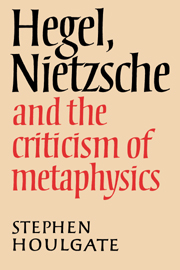Book contents
- Frontmatter
- Contents
- Preface
- Abbreviations and translations
- 1 The Hegel–Nietzsche debate
- 2 Nietzsche's view of Hegel
- 3 Nietzsche and metaphysics
- 4 Hegel and metaphysics
- 5 Speculative thought and language in Hegel's philosophy
- 6 Hegel's conception of the judgement
- 7 Context and the immanence of rationality in Hegel's Phenomenology
- 8 Hegel and Nietzsche on tragedy
- Notes
- Bibliography
- Index
1 - The Hegel–Nietzsche debate
Published online by Cambridge University Press: 18 November 2009
- Frontmatter
- Contents
- Preface
- Abbreviations and translations
- 1 The Hegel–Nietzsche debate
- 2 Nietzsche's view of Hegel
- 3 Nietzsche and metaphysics
- 4 Hegel and metaphysics
- 5 Speculative thought and language in Hegel's philosophy
- 6 Hegel's conception of the judgement
- 7 Context and the immanence of rationality in Hegel's Phenomenology
- 8 Hegel and Nietzsche on tragedy
- Notes
- Bibliography
- Index
Summary
Anyone attempting a comparison of the philosophies of Hegel and Nietzsche is immediately confronted with what seems to be an intractable difficulty, for the two men represent ‘fundamentally divergent types of philosophical style and temperament’. Hegel is a systematic philosopher who places his faith in the rigorous and methodical unfolding of dialectical reason, whereas Nietzsche is an unsystematic, highly literary writer, the champion of brilliant isolated perceptions and colourful, arresting metaphors. Linguistically the philosophers are worlds apart. Hegel's speculative discourse, whatever its intrinsic merits and purpose, strikes many, including Nietzsche, as cumbersome and obscure, whilst Nietzsche's lively and lucid style seems, as B. F. Beerling puts it, to defeat with its light-footedness the innate ponderousness of the German tongue. These differences raise awkward questions for the commentator: Why should we undertake a comparison of Hegel and Nietzsche? And how are we to undertake that comparison? Are not the philosophers simply too far apart from each other to warrant or even to allow comparative evaluation? In this chapter we will survey some of the answers that have been given to these questions.
The effort of comparing Hegel's speculative philosophy with Nietzsche's Dionysiac philosophy of life has been justified on many different grounds. The most direct justification has come from Gilles Deleuze.
- Type
- Chapter
- Information
- Hegel, Nietzsche and the Criticism of Metaphysics , pp. 1 - 23Publisher: Cambridge University PressPrint publication year: 1986

